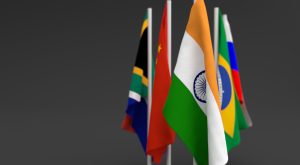Leaders of the BRICS nations – Brazil, Russia, India, China, and South Africa – met in Johannesburg last week, with South Africa hosting the 15th summit meeting of the five-nation grouping. It was their first in-person summit since 2019, due to the COVID-19 pandemic. The meeting assumed significance amid important geopolitical developments including the Russian invasion of Ukraine, which has entered its second year.
Four of the BRICS leaders were in South Africa, while Russian President Vladimir Putin joined virtually. Given that the International Criminal Court has issued an arrest warrant for Putin “for the war crime of unlawful deportation of population (children) and that of unlawful transfer of population (children) from occupied areas of Ukraine to the Russian Federation,” Putin decided not to travel to South Africa. South Africa is a member of the International Criminal Court and a signatory to the Rome Statute; it would ostensibly need to cooperate with the court to arrest Putin if he traveled to South Africa. Putin’s absence removed a major diplomatic headache for South Africa.
For all the rhetoric on respect for international law by the BRICS, the Russian invasion of Ukraine and the atrocities committed against humanity in Ukraine have been overlooked by the BRICS leaders. The themes constantly sounded by BRICS attendees — promoting multilateralism and safeguarding fairness and justice in international affairs — ring hollow.
A press release from the Indian Prime Minister’s Office said that the BRICS summit is “an opportunity to review progress of the initiatives launched by the grouping, and identify future areas of activity.” Addressing the BRICS leaders at the plenary, Modi identified specific proposals for strengthening inter-BRICS cooperation. This included space, digital public infrastructure, skill mapping, and traditional medicine.
The proposal for space cooperation would further the BRICS agreement of 2021, in which the five leaders agreed to remote sensing satellite data sharing. The agreement, signed during India’s BRICS presidency, involved developing “a virtual constellation of specified remote sensing satellites of BRICS space agencies and their respective ground stations will receive the data,” which will supposedly enhance “multilateral cooperation among BRICS space agencies in meeting the challenges faced by mankind, such as global climate change, major disasters and environmental protection.”
Six existing satellites are supposed to be part of the BRICS satellite constellation: Gaofen-6 and Ziyuan III 02, both developed by China; CBERS-4, jointly developed by Brazil and China; Kanopus-V, developed by Russia; and Resourcesat-2 and 2A, both developed by India. While this constellation may be developed with the intent of contributing to the public good of the developing world, the same satellites, depending on the resolution, can be used for snooping or for other nefarious purposes. Given the adversarial nature of relations between India and China, particularly since the summer of 2020, India should be wary of such cooperation that involves China, not that Beijing needs these satellites to surveil the Indian landmass or maritime spaces.
The expansion of BRICS created quite a buzz amid the summit, but there are differing visions among the members about the group’s role in shaping the global order. China, for example, noted that “Right now, changes in the world, in our times and in history are unfolding in ways like never before, bringing human society to a critical juncture.” Xi’s speech, read by Chinese Commerce Minister Wang Wentao at the BRICS Business Forum 2023, elaborated:
Should we pursue cooperation and integration, or just succumb to division and confrontation? Should we work together to maintain peace and stability, or just sleepwalk into the abyss of a new Cold War? Should we embrace prosperity, openness and inclusiveness, or allow hegemonic and bullying acts to throw us into depression? Should we deepen mutual trust through exchanges and mutual learning, or allow hubris and prejudice to blind conscience? The course of history will be shaped by the choices we make.
Irrespective of China’s belligerence against its neighbors and those further afield, China is not short on rhetoric. It is not clear, however, if Xi’s articulation found much resonance with the other BRICS members. Brazilian President Luiz Inacio Lula da Silva highlighted a possible difference of opinion within BRICS. Lula reportedly said, “We do not want to be a counterpoint to the G-7, G-20 or the United States. We just want to organize ourselves.”
Also, on the issue of reducing dependency on the U.S. dollar and exploring alternate currencies for trading among BRICS countries, there was not a unanimous view. Putin reportedly said in a pre-recorded statement, “The objective, irreversible process of de-dollarization of our economic ties is gaining momentum.” However, the host nation’s Finance Minister Enoch Godongwana clarified, “No one has tabled the issue of a BRICS currency, not even in informal meeting. Setting up a common currency presupposes setting up a central bank, and that presupposes loosing independence on monetary policies, and I don’t think any country is ready for that.”
According to media reports, BRICS expansion appears to have found resonance with all the member countries. Given the fractured nature of global politics and failure of multilateralism in delivering on anything from development to security, BRICS is trying to place itself as a voice of the Global South, which has been appreciated by all the members. This is despite the fact that there is no concrete agenda driving the Global South’s goals. South Africa, the host of the 2023 BRICS Summit, said that more than 40 countries have shown keenness to join BRICS and around two dozen have reportedly made formal appeals for the same.
Given the diverse issues being taken up in the BRICS, it does not appear to have been easy to develop a coherent vision for the grouping. An expansion of BRICS without a coherent agenda may bring in far too many differences in views, with no centralizing theme. Nevertheless, six countries — Argentina, Egypt, Ethiopia, Iran, Saudi Arabia, and the UAE — are slated to become members of the group from 2024.

































